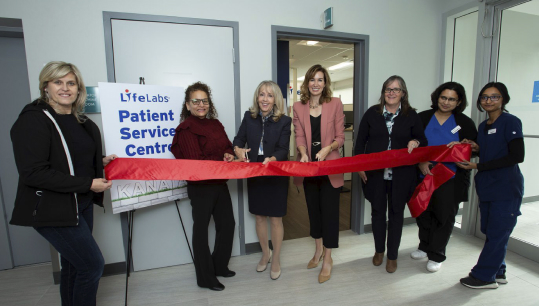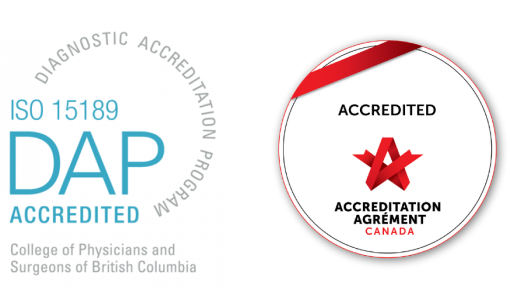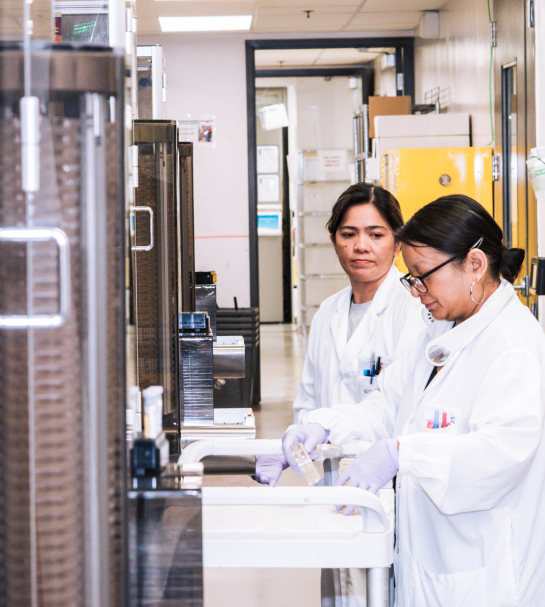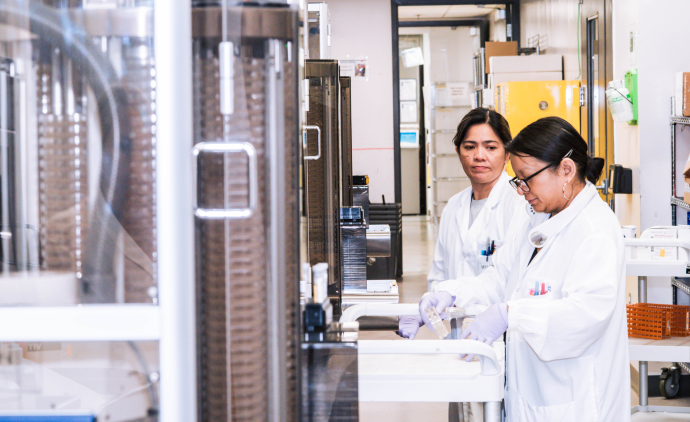Reaching Out and Caring
for Our Customers
We are passionate in our belief that all Canadians deserve access to high-quality diagnostic testing. This year, we took several important steps to enhance the accessibility and convenience of our locations, while also focusing on accelerating the modernization of our capabilities.

Expanding Access and Convenience
Of our five new Patient Service Centre (PSC) locations, our latest PSC in Richmond, B.C., is also equipped with LifeLabs’ first collection room designed specifically to be a calming environment for customers with autism spectrum disorder (ASD).
This facility adds a new dimension to our Serving Customers with Autism program, which began in 2017 and is grounded in a partnership with Pacific Autism Family Network in B.C. and the Autism Research Centre at the Holland Bloorview Kids Rehabilitation Hospital in Ontario. Through this program, all employees working in our PSCs have been trained and are equipped to make blood collection a positive, stress-free experience for customers with ASD.
Achieving Operational and Diagnostic Excellence
LifeLabs’ people generated outstanding results during the accreditation assessment conducted by the College of Physicians and Surgeons of B.C. Diagnostic Accreditation Program (DAP) and Accreditation Canada Diagnostics (ACD).
As Canada’s leading provider of laboratory diagnostics, LifeLabs must fulfill stringent provincial regulatory requirements and maintain ISO15189 compliance to ensure the quality of its service and the safety of its facilities. “We are proud to have exceeded many of the accreditation requirements,” says Jennifer Cudlipp, Chief Operating Officer. “Our tremendous employees and collaboration at many levels, as well as our strong focus on continuous improvement, have enabled us to achieve these results.”



Elevating Lab Precision with an Innovative Approach
LifeLabs’ commitment is to provide the best possible diagnostic information for physicians and customers. That means investing significant resources to stay up to date with improvements in testing equipment and methodology.
Currently, LifeLabs is in the midst of an ongoing, multi-phased initiative to move chemistry testing to a new, more advanced platform, the Abbott Alinity high-volume chemistry analyzer.
Our Surrey, B.C., laboratory also adopted a new multiplex molecular testing platform and new testing algorithms for gastrointestinal pathogens to meet updated provincial requirements. The new platform allows faster turn-around and more sensitive testing, making test results more informative for physicians and their patients.
Our scientists stay up-to-speed with research in their fields, and we frequently adjust our test offerings to reflect the latest in evidence-based best practices. In November 2022, we began offering FIB-4 index testing based on the recommendation of the American Association of Clinical Endocrinology (AACE). FIB-4 is a non-invasive and accurate index that assesses the risk of developing fibrosis in individuals with specific types of chronic liver disease. Understanding the level of fibrosis risk helps physicians to come up with the best treatment plan for their patient.
Supporting Canadians’ Health by Caring for the Environment
LifeLabs’ people are passionate about environmental sustainability. We care about the health of the planet, both for its own sake and because we understand that environmental factors have a significant impact on Canadians’ health.
In 2022, LifeLabs continued to expand and strengthen our sustainability measures, led by our expert Environmental Sustainability team.
“Sustainability is an area where real innovation is possible,” says Elyse Dumanski, Director of Environment, Health, Safety, and Sustainability. “Our team brings a lot of commitment and creativity to the work of reducing LifeLabs’ environmental impact.”
In one major new initiative, LifeLabs installed telematics devices in all fleet vehicles. Telematics devices are small computers that connect to a vehicle’s GPS system and engine. Among other things, they can provide the ability to monitor fuel consumption, identify vehicles with high emissions, and optimize driving routes to save fuel. The use of telematics has improved the fleet’s fuel economy by 33%, resulting in a significant reduction in carbon emissions.
LifeLabs also completed comprehensive pollution prevention plans at 14 laboratory locations last year. To complete the plans, the teams identified each wastewater stream, measured its volume, and implemented an appropriate waste treatment and disposal solution to ensure that no contaminants were entering the local water system or the environment.
In addition to these new initiatives, LifeLabs will continue to enhance our existing environmental sustainability program now and into the future.


 BACK TO HOME
BACK TO HOME